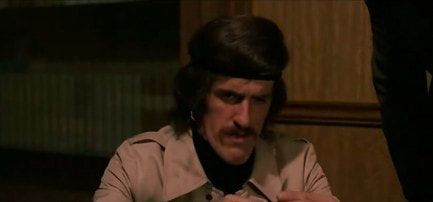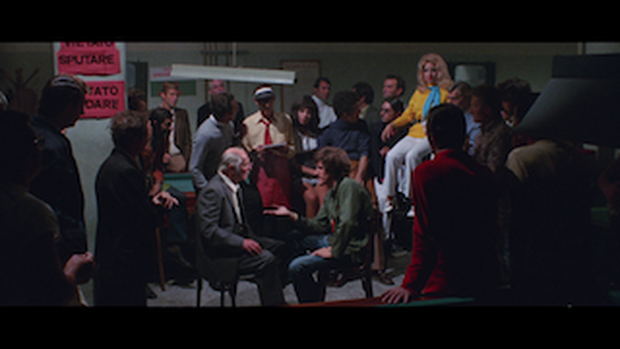|
I am mildly obsessed lately with character introductions . It's really fascinating the choices that are made in how you introduce a character to an audience. They can be seemingly pointless ways to bring a character into the scene or complex ways to drive a story further, giving glimpses into the protagonist's thoughts, motives, etc. This is especially true of smaller supporting characters, ones that are only around for a few scenes. These bit players might be crucial in revealing information about the story. In a mystery, these characters are sometime the ones you really need to pay the most attention to as a viewer. (It's at this point I need to say if you haven't seen Cat O'Nine Tails yet, don't read further. Go watch it, it's on Amazon, then come back.) Such is the case with the character of Gigi the Loser (Ugo Fangareggi) in Dario Argento's Cat O'Nine Tails (1971). While Gigi is only in two scenes, he serves move the story forward, revealing information about characters that will prove to be useful (read red herring). Gigi is a criminal, but not a good one, thus "the loser" portion of his name, but he's pretty good with locks. It is because if this talent, Carlo seeks out Gigi. It Gigi's talent for locks that allows Carlo to gain access to information about the Terzi family. That being said, Gigi's importance to the story is not why am writing this piece. I love the introduction of his character to the audience. Gigi the Loser is introduced through a series of insults - you see, he is having an insult battle to see who can use the most insults consecutively without stopping. So our first introduction to this battle is auditory, we hear the insults before we see Gigi, which I think if crucial (get to that more in a minute). Depending on what version of the film you are watching the insults can be seen as almost comical - in the version I watched for this post, the audio was Italian with English subtitling and I am under the impression that the subtitles censored the actual meaning of the Italian words. Needless to say, Gigi wins with 137 insults, over his opponent, the Priest, who has only 125. We won't get into the potential symbolism of naming a character in an insult battle the priest, but it fits well within the framework of Argento's and other Gialli filmmakers' views on organized religion. After winning his battle, Gigi sees Carlo and they talk about the potential job. Gigi recounts that he learned some new insults from his last cellmate in prison, implying he is, in fact, pretty unlucky as a criminal. Though this doesn't stop him from taking on the "breaking and entering" job that Carlo has asked him to help with.
Being completely enamored with this character introduction has led me to watch this scene, and preceding one, over and over. One of the most interesting things I've noticed about the scene transition is this play of the audio of Gigi's insults over the previous scene as a transition. It seems to say something about Carlo as a character. Carlo has just had sex with Anna, the daughter of the Dr. Terzi. Anna mentions that her father wants her to go to the country for the weekend with them, and Carlo suggests that she does. They've just avoided an attempt to poison them, or at least Carlo, trough some tainted milk. So,both Anna and Carlo can agree taht getting her out of the city would probably be best. Side note: who drinks room temperature milk after sex, and not like a sip, like a large glass of warm milk? To each their own I guess. Anyway, Carlo takes this moment, this intimate news and uses it to gain access to the Terzi home. He knows they're going to be gone. He has betrayed his lover's confidence. And it is with this that we are introduced to Gigi, the character who will give him access to that home. Gigi's insults play over the final seconds of this scene like a direct calling out the the character of Carlo. Argento uses this transition and the introduction of Gigi to clue us in a little on the nature of Carlo - reporter who wants to get to the bottom of a story, no matter what. After watching this, it really changes the way I view Carlo throughout the rest of the film. I only wish more Gialli would have used insult battles. Nothing like a good glass of J&B and some insults slurred at you by a priest to really make you think about where you really are in life.
0 Comments
|
The Distracted bloggerArchaeologist by day, blogger by night. I am distracted by film. ArchivesCategories |


 RSS Feed
RSS Feed
